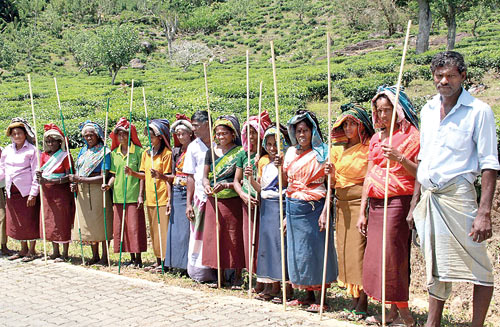Labour shortage on estates? Follow the Endane Estate contract plucking model
ENDANE ESTATE, Kahawatte – Many Sri Lankan regional plantations have been facing a daunting problem during the past two decades – a dearth of workers – which adversely affected the production of tea.

Endane Estate employees
A few years back tea estates were teetering on the brink of collapse due to a loss of production coupled with rising costs.
The economies of estates remained fragile when their production hit low levels. However managers, grappling with the problem, found a novel solution to circumvent the worker shortage by allocating plots of estate land to workers so that they could nurse them and increase productivity.
To the astonishment of many estate managers the new method paid dividends in the long run. They found that apart from an increased volume of production the workers too were happy with an additional income to supplement their basic wage. Over the years the new methods was tried out and it has proved successful in one organisation – the Endane estate in Ratnapura. The project is a hallmark of the Endane estate management to uplift the tea industry from a downturn spiral.
Last week several media personnel visited the Endane Estate at Kahawatte to take a closer look at the smallholder system plucking which is now being practiced by other estates in the area with much coherence and vigour to increase productivity due to labour shortage. Endane estate is located on a steep hill with a narrow winding road and its Estate Superintendent Tharaka Gunatilleke and the Manager Sujeewa Godage were at hand to greet the media.
The briefing to the journalists commenced after a traditional Hindu pooja conducted by a priest adjacent to a conference hall at the estate.
Speaking at a briefing, Mangala Navaratne, one of the estate officials, said the smallholder plucking system commenced in 2000 on a small scale owing to the shortage of labour.
The labour requirement for the Endane estate with 450 hectares of tea land was 900-1000 but only 400-500 workers worked on the estate which was inadequate to maintain plucking and for harvesting purposes. “This eventually led to the neglect of tea land that contributed less tea being produced in the estate. We needed 60-65 per cent of good leaf for the manufacture of quality tea. Therefore timely harvest of tea leaf was vital for manufacture.”
He emphasized that the concept of the smallholder system plucking is meant to release blocks of tea land to registered workers in the estate under an agreement for a period of six months. Additional blocks of land were released to estate workers who had larger families. “Each block consists of 1000-1200 tea bushes and contractual plucking was undertaken on Saturdays and Sundays. On all other five days they have to work in the estate.”
He said material such as fertilizer was provided by the estate except for manual labour. Fertiliser provided by the estate was deducted from their income. More than 322 estate workers were the owners of contractual blocks and of a total of 360.22 hectares, 138.22 hectares were given out under the contract plucking scheme. “We have found that on Saturdays and Sundays we get a good crop. Workers can earn a sum of Rs. 8,000-12,000 in addition to their monthly salary,”
He said the problem faced by the low country tea estates was to retain labour as they find other employment elsewhere to supplement their income. “They work at gem pits to earn a living.”
With the introduction of the smallholder system plucking “we have managed to retain workers in the estate during the weekends. These days they stay back to earn something extra.” Endane Estate was the pioneer in introducing smallholder system plucking two decades ago when they started with four hectares. Over the years they have extended it up to 200 hectares to bring profitability to the company. Endane Estate is owned by Kahawatte Plantations Plc.
Mr. Godage said the Sinharaja Forest Reservation lying adjacent to Endane Estate has posed some problems for the estate. “The forest seems to be swallowing our estate slowly.” Mr. Tharaka Gunatilleke said even villagers from other areas encroach on estate land. S. Jayaraman, a supervisor, said the workers get extra income through this scheme. M. Parameswari, an estate worker, said they were happy earning “something extra”.


